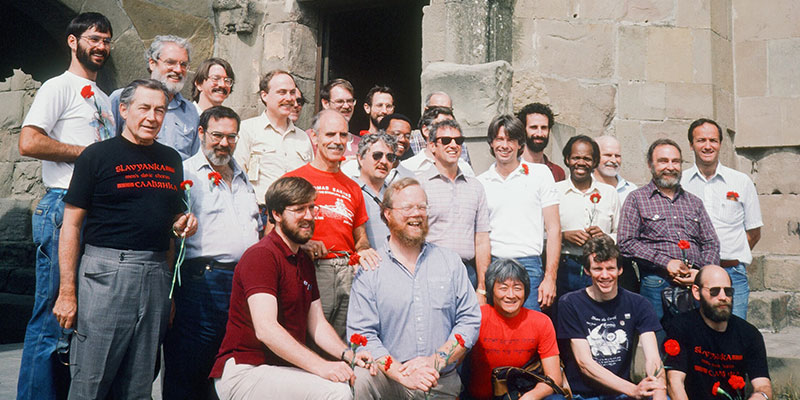My trip to the former USSR stands out not because I have traveled extensively, but because of the significant chasms that needed to be bridged on so many levels—political, economical, cultural, language, religious. The opportunity was presented by my being a member of Slavyanka, the Bay Area Men’s Slavic Chorus, a chorus that sang folk and liturgical music from Russia, Georgia, Armenia, Macedonia, Ukraine, etc. I heard Slavyanka for the first time when the chorus performed in Stewart Chapel on the campus of San Francisco Theological Seminary in San Anselmo. I was serving on the faculty at the time. Over the years, I had sung in choirs, most notably the Lewis & Clark College Choir, and in various church choirs. But I was so moved by the beautiful and rich sound of an all male chorus and the deep mysterious music of the Orthodox liturgy that I decided to try out for the choir, which required going in for an audition. And I met Paul Andrews, the Director of Slavyanka. I learned that like the majority of the members of Slavyanka, Paul was a Yale graduate and a former member of the Yale Russian Chorus. Paul did not come across as a musician, much less a choral director. Yet, I had never met or sung under the direction of anyone like Paul. Paul reminded me of my Old Testament professor, James Muilenburg, who embodied the characters and stories in the Bible, especially the prophets in his lectures. Paul danced when he directed; and with his facial expressions, especially his eyes, he performed the pieces we sang. I passed the audition and was classified a second tenor even though I had always been a first tenor in all the other choirs I had sung with. The first tenors in Slavyanka were what I would describe as counter-tenors, their voices soaring far above any note I could attain. At the other end, the bass voices made music where I expected grunts. Amazing! The combination of voices, singing acapella, spanning such a huge spectrum of notes created a unique sound, a sound that slavic liturgical music demanded. Often in rehearsals, I would choke up, unable to continue singing because I was so moved by the sound created by the chorus. It was not just the music, it was also Paul. Paul became my pastor and mentor in unexpected ways. He was a brilliant theologian, able to share commentaries on the music we were singing with wise and insightful theological reflections.
The restrictions in the then Union of Soviet Socialist Republics made arranging the venues for Slavyanka to perform challenging. We managed to perform public concerts in Moscow, Leningrad, and Yerevan, Armenia. We had impromptu concerts on the streets of Moscow and in Cathedrals in Tibilisi, Georgia. Our most impressive performance was before the Catholicos at the Mother See of Holy Etchmiadzin of the Armenian Apostolic Church in Yerevan, Armenia. It was the equivalent of singing before the Pope in Rome.
One of my memorable experiences occurred during free time. I ventured into the heart of Moscow as a tourist and got lost. I assumed that my pocket map would help me find my way wherever I wanted to go and whatever I wanted to see. I just did not factor in taking the subway and coming out from underground, finding myself totally disoriented. A kind Russian speaking elderly man noticed my dilemma and offered his assistance. He spoke only Russian and I spoke English (Chinese was even less helpful). So with hand gestures and facial expressions, we managed to communicate just well enough to begin the journey back to the hotel. He led me down the steep elevator to the underground subway station and had me follow him onto the correct train. I dutifully followed him off the train at the correct station, up the long escalator, and then down a couple of streets until we were a block from my hotel. He pointed to the hotel and I breathed a deep sigh of relief, overwhelmed by this stranger’s generous hospitality. I thanked him and wished I could give him a gift for his efforts. Earlier, I noticed that the man smoked a pipe, which I did also at the time. So I quickly reached into my pocket, pulled out my tobacco pouch, and handed it to him. He hesitated; then he reached into his own pocket and pulled out a cigar stub, demonstrating how he crumbled the cigar between his fingers into the pipe bowl. He took my pipe tobacco, put it up to his nose and inhaled deeply, savoring the aroma. It was his turn to struggle with how to express gratitude. Somehow, it was in our mutually awkward attempts at expressing gratitude non-verbally that bonded us. When we parted, we knew that we would never see each other again. We didn’t even know each other’s name. It didn’t matter. We were one by the way we handled our shared circumstances. At that moment, I was lost and a total stranger came to my rescue. At that moment, the stranger received an unexpected, prized gift from me. We each gave the other something prized. The gifts in and of themselves were not lavish and of great value; they were priceless because they were the very thing needed at the moment. The miracle was that the exchange was not planned, but unexpected. And it became a miracle because deep needs were met by the generosity of the other.

Thank you (imagine softly said by me), Cal.
One which I will pass along to Dave Miller, Choir chair at Congregational Church of the Peninsula and one of your Tai Chi teachers.
Gwen
As always, you are welcomed Gwen. Know that I appreciate knowing you are reading my posts and your comments are appreciated.